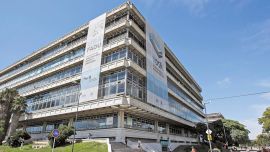NOTA:
A failed deal to purchase one million doses of the Sputnik V vaccine by the San Juan provincial government has helped lift the curtain that shields the murky world of secondary markets for Covid-19 inoculations. It also illustrates how, in the midst of the relentless coronavirus pandemic, production shortages coupled with the use of intermediation can lead to lucrative deals that see poorer nations paying substantially higher prices. It also helps shine a light on the difficulties the Alberto Fernández administration has faced with its vaccination efforts, both caused by unforced errors and external factors.
In an in-depth investigation for Perfil, reporter Brenda Funes followed the trail of a botched operation to buy a million doses of Sputnik V, divided evenly between first and second doses, by San Juan Province Governor Sergio Uñac. The story really begins back in April when, under pressure given the government’s lethargic vaccination campaign, Cabinet Chief Santiago Cafiero announced that Argentina’s provinces and the City of Buenos Aires could lead their own negotiations to procure vaccines. At the time several regions announced plans to purchase Covid-19 vaccines including Buenos Aires (10 million doses of Covaxin), the City of Buenos Aires and Mendoza (CanSino), Salta (Johnson & Johnson), and Jujuy (Sinopharm).
San Juan was also interested and went after AstraZeneca jabs, looking to procure around 1.6 million vaccines for some US$50 million, or US$31.25 per dose. This is when vaccine brokers flooded the scene with offers, with the provincial government receiving around 50 different proposals. Ultimately, they reached a deal with a German firm in the energy business named RuL AG, based out of Leipzig. The province agreed to purchase the million doses at 18 euros a piece, twice the 9.99 euros that the national government had paid the Russian Direct Investment Fund (RDIF) and its private subsidiary, Human Vaccine. Thus, the province deposited 18 million euros into an escrow account.
This, of course, brings us to an ethical issue: is it reasonable to pay twice the face value in order to guarantee a shipment of the precious antidote, particularly from the position of a humble province like San Juan? Governor Uñac believed so, and signed the deal, first with a third-level intermediary, Panamanian firm PMB Negocios SA. After agreeing on price and distribution schedule, a final contract was inked with RuL AG, which is led by Stephan Guth.
It isn’t entirely clear why Guth’s RuL AG is in the vaccine distribution business. Its skimpy website indicates they’re in the energy business, acting as oil traders, natural gas and electricity sellers in Europe and abroad. They are based out of Leipzig and their only visible face is Guth, who is involved in another three firms. Apart from being a director at a lower division German football club named FC Lokomotive Leipzig, Guth is on the boards of PHC Torpedo Leipzig (which promotes ice hockey in the city) and Nova Lipsia, in charge of sales and marketing. All of these firms have an extremely limited presence online and few, if any, additional directors, according to North Data, a research firm into the German corporate sector.
Both RuL AG and PHC Torpedo shared a certain Stefan Lindner on their boards of directors before Guth took over. In a 2011 piece in Bild, one of Germany’s largest tabloid newspapers, Lindner revealed he was looking to take Leipzig’s local team, the Icefighters, into Russia’s elite ice hockey division, the Kontinental Hockey League. “He is said to have excellent contacts with the Russian government and top management of the energy giant Gazprom,” noted the article, which reveals he ran oil trading firm TRI Holding AG and is married to Olga, his Russian wife. It isn’t clear whether Lindner is involved in this deal, but he clearly has had some level of relationship with Guth.
This is where we have conflicting stories. San Juan claims the contract had been breached given persistent delays in delivery times, coupled with incomplete documentation from the seller which was necessary in order to receive authorisation to import and use the vaccines in Argentina. The front men for the operation – the third-level intermediaries – say RuL AG had guaranteed the presence of the doses produced by Pharmastandard, a major Russian pharmaceutical company with authorisation from the Gamaleya Institute to produce Sputnik V, and provided documentation indicating the components were ready and reserved, waiting for pickup. All that was needed was for San Juan to send planes and receive proper documentation, once they had arrived in Moscow. By this point, more than three months had passed since the provincial government had embarked on its global vaccine adventure, and the intermediaries had offered to send a full one million doses of the second component, along with an extra 10,000. San Juan, claiming the contract has been breached, is waiting for its 18 million euros to be returned by the escrow agent, while the vaccine-brokers suggest they are being forced into legal action.
Now this raises a second ethical issue: as we noted previously in this column, there’s an acute shortage of second doses of the Sputnik V vaccine in Argentina, a state of affairs that prompted Presidential Adviser Cecilia Nicolini to try and put pressure on her Russian counterparts last week via an email that was later leaked. It revealed that RDIF/Human Vaccine had also been experiencing serious delays in its deliveries with the national government. Should San Juan, or the Fernández administration, pay twice the price for the scarce second component, when it has an ongoing contract that could be in breach given delays in deliveries? It seems San Juan, and the Fernández administration, don’t believe they should.
Vaccine diplomacy has been a defining characteristic of the Covid-19 pandemic, with Russia and China taking the lead globally, only to be followed onto the stage by the United States once Joe Biden took over from Donald Trump. Delivery delays have been persistent across the globe and that includes both Western pharma giants and state-run laboratories, particularly with middle and lower-income nations. Furthermore, the use of intermediaries charging exorbitant prices to said nations is also occurring, as a great piece by Pjotr Sauer, Jake Cordell, and Felix Light in the Moscow Times recently showed. Titled “A Royal Mark Up: How An Emirati Sheikh Resells Millions of Russian Vaccines to the Developing World,” it recounts how nations including Ghana, Guyana, Pakistan, and Lebanon were forced to work with intermediaries who took large cuts and, in many cases, were late on their deliveries.
We should expect more of these kinds of stories to emerge as the global pandemic refuses to give in. When staring death in the face, it is difficult to envision anyone being free of sin.




















Comments